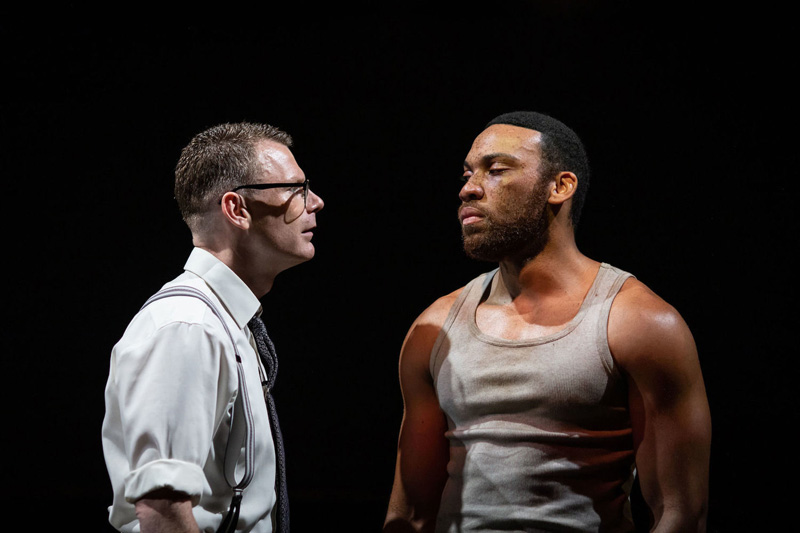“Statements after an Arrest under the Immorality Act”, Orange Tree, Richmond
Neil Dowden in outer London
3 September 2021
Athol Fugard’s 1972 play Statements after an Arrest under the Immorality Act is an unflinching account of two lovers caught up in the law banning interracial sexual relationships in apartheid-era South Africa. It is a less substantial work than his masterpieces The Island and Sizwe Banzi Is Dead that he wrote shortly afterwards, but the drama still has a shocking power in this 75-minute interval-less production at the Orange Tree.

Scarlett Brookes and Shaq Taylor. Photo credit: Helen Murray.
Statements follows on from the venue’s 2019 staging of Fugard’s early play Blood Knot (which focuses on the strained relationship between two half-brothers, one black, the other biracial). Here, we witness the perilous situation of married black man Errol Philander and older white woman Frieda Joubert who have embarked on a forbidden love affair. They meet in secret after dark at the library where she works during the daytime and where they first met when he went there to borrow books for his studies as a teacher. In the first half of the play, we see them together in half-dressed intimacy. But as well as the tender sensuality that entwines them, there is a strain arising from their very different backgrounds that will inevitably divide them outside their sanctuary in the cold light of day.
The fact that they are vulnerable to the external threat hanging over them makes their feelings more intense, as they know their affair may not last very long. This threat duly arrives in the shape of Detective Sergeant J. du Preez, acting on the tip-off from a neighbour. It turns out the police have been watching their movements from outside the building for some time. He proceeds to read out the arrest warrant (cited in the play’s title) with its inhumanly bureaucratic language. It seems there is no escape from the relentless wheels of the apartheid machine.
Characteristically, Fugard uses the particular dynamics of individuals to expose the inequities of race and class. The fear instilled by the white supremacist law of an oppressive regime is palpable, as are the corrosive effects of discrimination on natural human relations. There are times when the play seems a bit verbose and dramatically inert, but there is always an undercurrent of tension that bubbles away.

Richard Sutton and Shaq Taylor. Photo credit: Helen Murray.
The in-the-round production of Diane Page (winner of the JMK Award for emerging directors) subtly draws us into the cocooned but fragile world of the lovers. Designer Niall McKeever’s sunken pit suggests a hiding place but also later a trap, in which the protagonists sometimes embrace at the bottom but are more often perched around its edge. Although it makes a bold statement, it also tends to restrict the actors’ movement. Rajiv Pattani’s atmospheric lighting design includes police torchlights and the ensuing flash of photographs being taken after the lovers’ arrest for evidence in the forthcoming trial.And Esther Kehinde Ajayi’s expressive sound and score features a low electronic hum that has an increasingly unsettling effect.
There is a touching openness between the principals who vainly strive to come together outside time and place. Shaq Taylor’s Errol is a sensitive man with a wide-ranging intelligence who aspires to a better life than he has so unfairly been assigned. Scarlett Brookes’s fully committed Frieda is determined to hold on to her late-found love. As du Preez, Richard Sutton delivers some of his lines direct to the audience as if giving evidence in court, starting by dispassionately enforcing a brutal law but later descending into a racist, misogynist rant.
The outlawing of interracial marriages in South Africa may have been lifted in 1985 (and the apartheid system itself dismantled in the early nineties), but of course various forms of institutionalized racism are still very much in place around the world – and this play still packs a punch.









